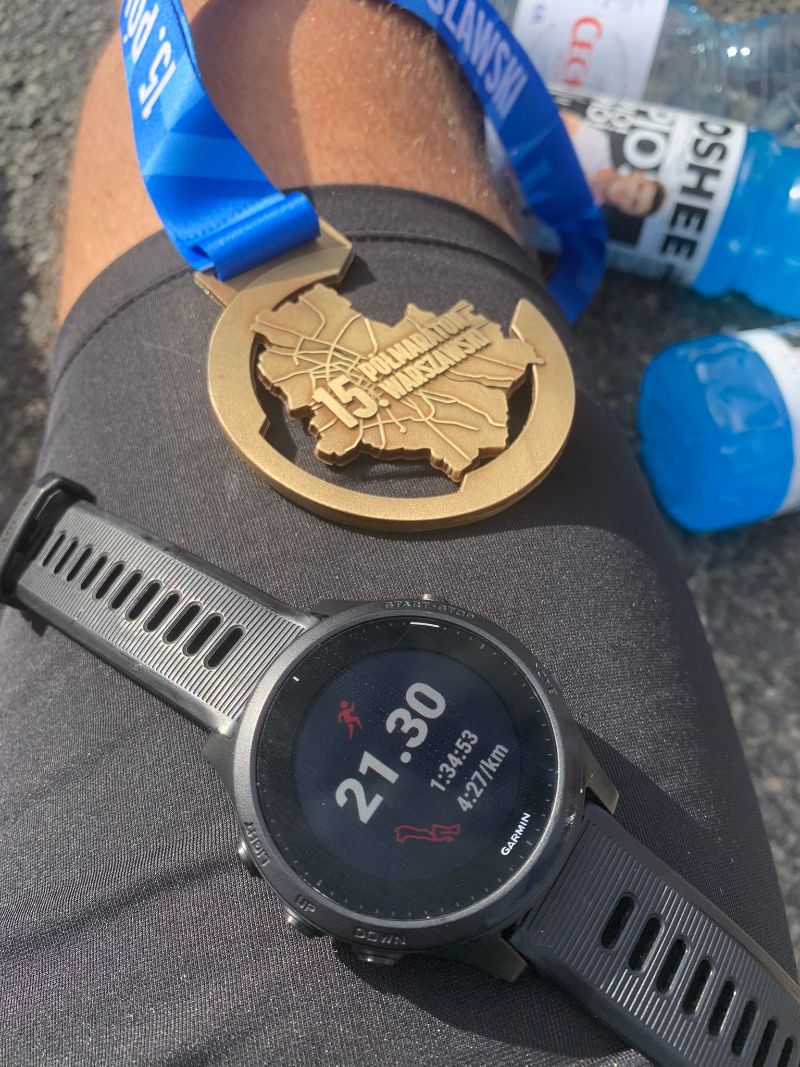Focus on what you can control and on lead indicators

Great book "The 7 Habits of Highly Effective People" (seriously, I recommend it to everyone to read at least once) points "Begin with the end in mind" as one of those habits. It is true. Not having an end in mind can be a disaster; you will drift in many directions in the best case. At worst ... you will finish where you don't want to be.
At the same time, I'm not so found about strict goal settings - one of many contradictions in my thinking (you have to get used to it).
Recently I've participated in the run. Half-marathon to check my training progress.
In this particular case, an end was clear - finish the run. That's it. There was also a plan and some assumptions about the result, but none was set in stone.
Even in a simple event, as a run, there are many moving parts and elements you can focus on: other people, starting position, weather, route, competition. I picked it up on purpose, as all of them are things outside of your control.
Even the final result itself is a thing outside of your control. You can do everything right, and then your shoe might break, or muscle cramps can hit you.
Here are lead indicators. If you haven't done MBA (as I), you might not be familiar with it, but there are two types of indicators (simplifying):
- Lead: happens before the result and are input into the process execution
- Lag: occurs as a result of a process and can be measured after the process will execute.
In the context of race, the result is a *lag* indicator. It is a result at the end of everything that will happen between the start and finishes (and also what happens before the start, namely training). Whatever you think about it, you can't control it.
What you can control are lead indicators. Suppose you put all the right effort into elements influencing lead indicators and execute a process (run). In that case, the result will happen—at least some version of it.
How I exercised this approach in my run in practice:
- I did my training - that is given, there is no result without preparation. It was the first time I had a scheduled training with some structure in the last six weeks before my run.
- I removed the result from my watch for the race. During the race, I was able to control only my heart rate and pace on my eye. Every kilometer passed my average speed during the last single kilometer distance.
- I had an indicator of pace range, which is needed to run on average within my target goal.
Doing it this way lets me focus on lead indicators in my run:
- Try to run each kilometer one at a time within the range ( I run the first ten not according to the plan, a bit faster)
- Stay fed and hydrated.
Last but not least: I reminded myself, "you run alone; it is not a race with others." Why? There is always a push to run with other runners as he can "pull you a bit." Why is it dangerous if it isn't your fellow runner with whom you set this plan together?
Because you don't know their strategy and plan, they might run with a different approach and goal in mind, and for you, it might mean you will burn your energy on their pace.
Those lead indicators allowed me to focus on what I controlled, run each segment at a similar pace (on official marks, I always had 4:30m/km avg pace), and arrive at the finish line in planned time.
Am I writing it all to brag about my run race? Nope.
*I observe a lot of people who focus on lag indicators that are outside of their control!*
Think about it. Things like sales goals, personal financial goals, development goals with distant time frames are beyond your control. Those are all "lag" indicators and while it is good to have it defined ("Begin with the end in mind"), what you should focus on is:
- Find out the lead indicators that are input to this result: sales calls and meetings, your savings vs. spending rate, the number of certificates you did, or time you spend on building new skills.
- Identify those within your control.
- Focus on execution of those goals which are within your control and measure lead indicators
Filter out the noise, focus on your definition of the end but don't think about it (the end) but things on the way, which contributes to it and you can control.
The menace of mental accounting
Recently I run a half-marathon (not the first one). I did well. First thought after the race was, "Oh, I missed it," but then it was - 1:34:51 for a half-marathon is a great time. I even qualified in the top 100 men in my age category.

What was the first thought when I arrived at the finish line of this race? You don't have to believe me, but it was "Oh crap, I missed it." What was "IT"? It was my expected result for the race.
I had a plan that assumed running it at 4:30m/km pace and finishes around 1h35m mark, but somewhere along the start line, I started to believe I could do it in 1h30m.
That was mental accounting in action. I had this optimistic thought, "Maybe I can do it in 1h30m," and suddenly it was a goal in my head. Everything I could control was set to finish in my target time. I set my watch for it. It was a plan, but my mind started to believe in a "better version of a future."
It is a trap.
It can diminish the fact that you did great and that you did what you planned, but somewhere along the lines, you "accounted" for a slightly better version of the truth. Then with your intended result, you are disappointed, even if before you would accept this result as a "flying A."
How to fight against it? Anchor your expectation. Write it down on a piece of paper or a note. Then look at it as a checkpoint when you think you did terribly. Is it terrible?
I didn't write down the expected result this time. My anchor, in this case, was my coach calling me after the race and saying, "What the f..k you are talking about?" You did great, and it is a result you planned for it." He was right.
If needed, a simple piece of paper with a noted goal can be your "What the f..k" call.
Focus on what you can control. Focus on lead indicators and anchor your expectations to know, that you did well when you arrived.
Photo by Michal Mrozek on Unsplash




